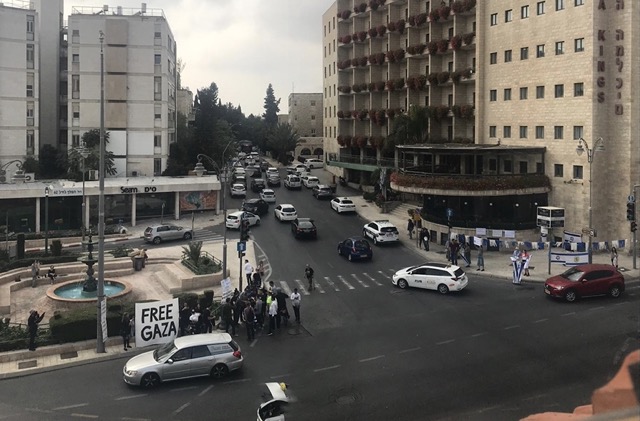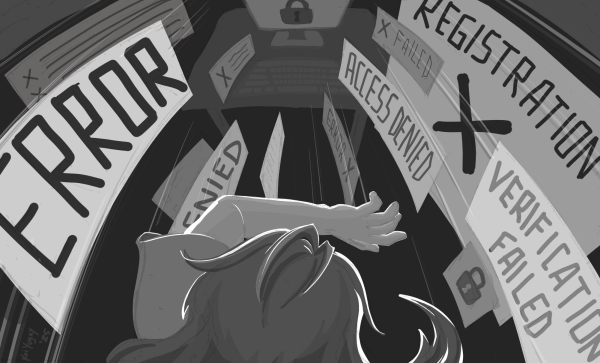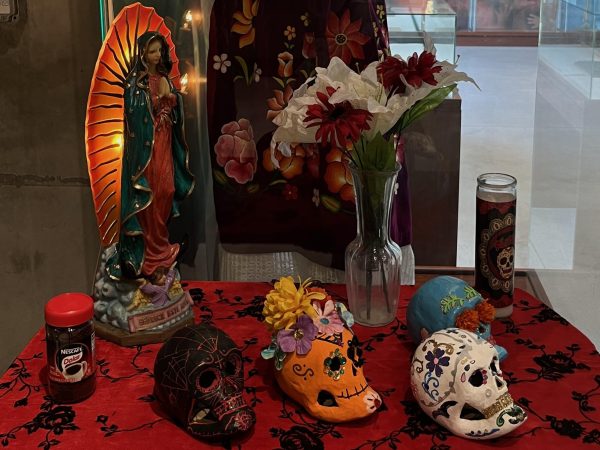Guest Column: The age-old slander of Israeli ‘apartheid’
A protest occurs at Paris Square in Jerusalem outside of a roomate’s window on Nov. 19, 2019. The square is known for its many peaceful protests about the Israeli-Palestinian conflict. The right to protest in Israel is protected by the judiciary as a “fundamental right.” Photo courtesy of Ethan Cohen
Editor’s Note: Students, employees and other El Camino College community members outside the journalism staff are also invited to submit guest columns for consideration as per The Union’s policy. All columns are subject to editing for length, grammar and style. They must be free of libel and in good taste. Publication or rejection of any column is at the sole discretion of the editorial board. All opinions are those of the author and do not reflect the opinion of The Union.
Ethan Cohen is a former Union editor and reporter. Cohen has graduated from El Camino College and is no longer a staff member.
It is not uncommon for detractors of the state of Israel to accuse it of engaging in “racist” and “discriminatory” practices.
I relegated such accusations to fringe groups far from here. But during El Camino College’s recent commencement, it came front and center from the Associated Students Organization’s president, Jana Abulaban.
Her false claim that Israelis are “killing and torturing Palestinians as we speak” only proved to show El Camino as another public institution stained by such remarks.
One must ask whether such accusations levied against Israel are constructive or just serve to demonize it as the only Jewish nation.
Jana’s speech exhibited a lack of appropriateness, further driving a wedge between opposing sides of the conflict, reinforcing the false belief that Jews have no history in the region.
The dynamics of Jewish-Arab relations in Israel and the West Bank cannot be reduced to a simple narrative of Jewish discrimination. We must acknowledge that there exists mutual hostility and suspicion between both sides.
While Israel struggles with societal challenges like any other country, applying the “apartheid” label to it is an unfair and inaccurate slander that hinders the long, sought-after peace process.
Many focus their attention solely on Israeli wrongdoings toward Palestinians and often fail to acknowledge the hardships faced by Jews on the other end of the conflict.
Mizrahi Jews, including my own grandfather, were forcibly displaced from Arab countries before the 1948 War of Independence, also known as “Nakba,” by Palestinians. My grandfather was expelled from Egypt and allowed only one bag, forsaking everything he owned.
To exiles like my grandfather, the State of Israel was a beacon of hope for Jewish communities across the world facing anti-semitic pogroms. It embodied the two-thousand-year dream of returning to the land of Jewish native origin and living as a member of his nation.
I have seen firsthand the principles that a democratic Israel emits.
Israel’s Declaration of Independence states it will “ensure complete equality of social and political rights to all its inhabitants irrespective of religion, race or sex” and “safeguard the Holy Places of all religions.”
Multiple protections exist in Israeli society to ensure these rights for Israeli Arabs, which comprise 20% of the population, including political parties, independent courts and a free press.
Israeli policies within its borders and toward Gaza and West Bank are subject to ongoing disputes based on complex territorial dynamics shaped by multiple conflicts in which Israel’s neighbors refused to accept its existence.
Nevertheless, it is important to recognize these disputes should not serve as a breeding ground for terrorist and militant organizations, which routinely target Israeli civilians and call for their extermination.
Such relentless aggression inevitably triggers a strong response to protect innocent lives and creates a never-ending spiral of violence, diminishing prospects for peace.
As noted by Richard J. Goldstone, a former justice of the South African Constitutional Court: “Those who conflate the situations in Israel and the West Bank and liken both to the old South Africa do a disservice to all who hope for justice and peace.”










